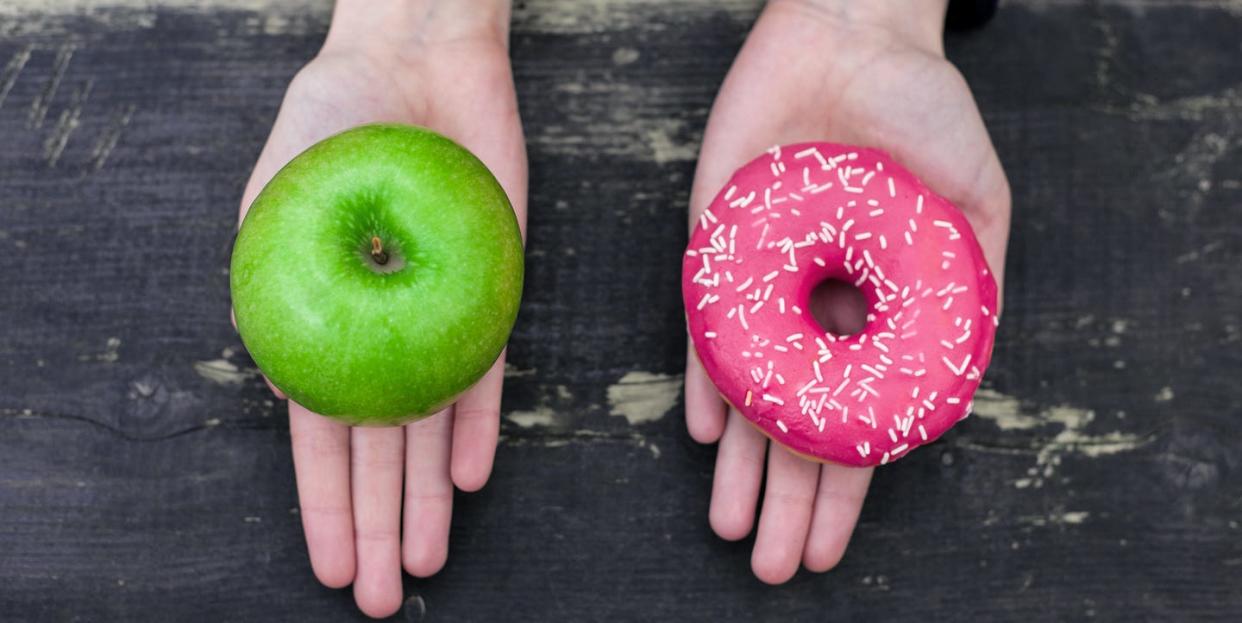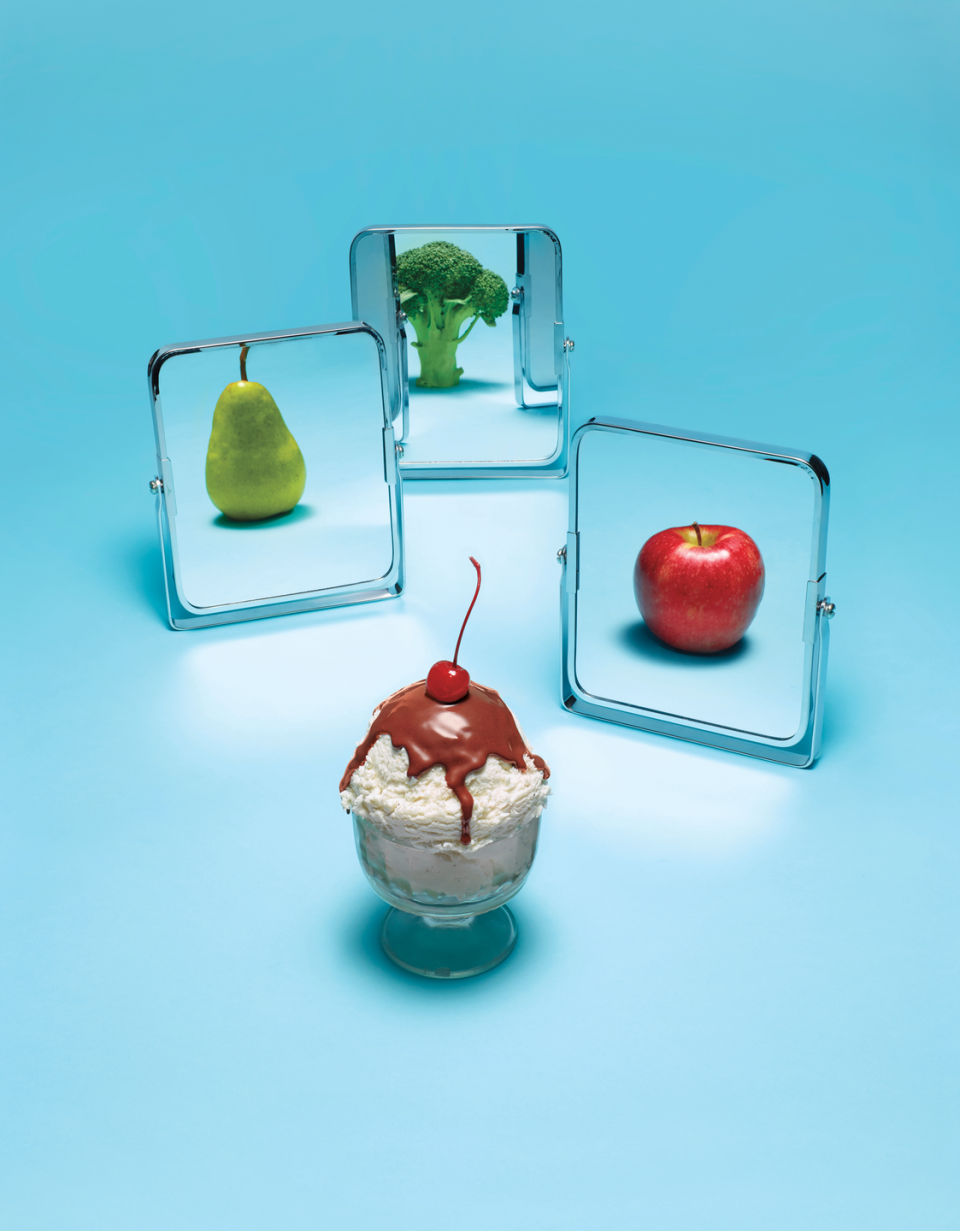Willpower Is a Sham. Here Are the Habits That Will Actually Help You Lose Weight

Stop us if you’ve heard this one before: A smart, accomplished woman who knows a thing or two about health decides to kick her habits up a notch in January. Maybe she’ll summon a hefty dose of willpower and start doing yoga, or juicing, or eating more leafy greens, or going to bed earlier-the particulars don’t matter.
What does matter is the outcome. For a few days or maybe weeks, she adheres to her plan. Then she gets busy. Or stressed. Or tired or bored or distracted. And, well, you know the rest: A month down the road, she finds herself making a milkshake in her juicing jar and streaming The Big Bang Theory at 11 p.m., her willpower crumpled in the trash alongside a bag of limp and liquefying spinach-her New Year’s resolutions just a memory.
Is our hypothetical woman weak? Completely lacking in self-control? Nope. She’s just putting too much faith in willpower-a concept that in itself turns out to be flawed. “We used to think that the people who were able to adopt healthy habits had rock-solid willpower,” says Wendy Wood, PhD, provost professor of psychology and business at the University of Southern California. “But after studying how changing habits actually works, we know that these people actually rely on a variety of other strategies that are far more nuanced.”
Indeed, the whole notion of willpower is now being called into question. Health experts have long viewed it as being like fuel in a car: We each have a fixed supply of self-control; the more we use it throughout the day, the more depleted our reserve becomes. But a lot of new research has poked holes in this limited-supply theory. And studies show that once a lifestyle change gets embedded in your everyday routine, it becomes automatic-which takes willpower largely out of the equation, says Wood.
That means when you want to improve your life (say, overhaul your diet or adopt a regular exercise routine), the real key is to form a new habit-which, according to research at University College London, can take anywhere from three to 12 months. How do you get there? Try the following research-backed approaches: No willpower is required to try them out.
Get comfortable with uncomfortable feelings
Have you ever inhaled several slices of pizza after a stressful day? (Right-who hasn’t?) This sort of thing happens because our emotions influence our self-control. To keep sadness or anger from derailing your good intentions, face the underlying emotion head-on the minute you feel a craving.
“Pause and think about what you’re feeling,” suggests Liz Chamberlain, PhD, a psychologist at the University of Colorado School of Medicine’s Anschutz Health and Wellness Center. “Try to identify what’s going on, whether it’s stress or boredom or worry. Then just sit for a few minutes and observe it.”
As you’re reflecting, she suggests, remind yourself that you’re not alone, that everyone feels these emotions sometimes. That act of self-compassion can ease the intensity of feelings. Stopping to sit with your emotions also buys you time so that instead of making a choice you’ll regret-like eating a muffin or skipping your fitness class-you can decide consciously what to do next.
Ellen Lutvak of Closter, NJ, was juggling her job along with caring for her two kids and her elderly parents when she realized that she reflexively turned to ice cream in moments of stress. But adopting this strategy has helped. “Now when I get that knee-jerk urge to eat ice cream, I pause and think about my emotions and brainstorm what will really make me feel better,” she says. “Sometimes I call a friend. Other times I get out my yoga mat and do a few relaxing postures. If I really need something sweet, I brew a cup of licorice tea or have an apple with peanut butter.”
Thinking I recognize this feeling, and I know it will pass can also help, says Laura Cipullo, RD, a nutritionist who helped Lutvak with her ice cream habit. A study at the University of Minnesota found that low-level anger, sadness, and anxiety lifted within a few minutes whether people ate their favorite comfort foods, a neutral food like a granola bar, or nothing at all. Sitting with your feelings could actually make you feel as good as eating a cookie-and you won’t regret it afterward.
Reframe your thoughts
Wendy Sydow, a judicial assistant in Erie, PA, lost almost 140 pounds over the past year after undergoing bariatric surgery, but still felt the emotional urge to eat. But after years of overeating, she began looking at exercise and healthy eating as things she gets to do rather than things she has to do. “Now that I weigh less, I have so much more energy, so I walk two or three miles every morning-something I never could have done before,” she says. “I feel lucky to be able to exercise. I celebrate the changes that have come with being healthier-like the ability to clean the basement or bend over to tie my nephew’s ice skates.” That new way of thinking keeps her on track.
Research shows that Sydow is on to something. Hedy Kober, PhD, associate professor of psychology, psychiatry, and neuroscience at Yale University School of Medicine, recently ran a study in which people were trained to think about the positive attributes of healthy foods: The researchers told them, for instance, that broccoli was crunchy and delicious and that if they ate it they’d feel good about themselves. The results were striking: “We found that we can actually get people to increase their cravings for healthy foods,” Kober says.
In a second study, her team trained people to engage in that same type of thinking repeatedly. They discovered that if people practiced looking at healthy foods and considering their wonderful qualities, it helped them make better dietary choices and eat fewer calories in everyday life.
It works the other way too, says Kober. Her studies have shown that people can substantially reduce longings for, say, doughnuts by thinking of all the negatives of eating them, like how they fill blood vessels with triglycerides and diminish energy. “Participants in a related project not only wanted the desired food less,” she says, “but also had reduced activity in the part of the brain that’s active during cravings and increased activity in the prefrontal cortex, the part of the brain associated with cognitive control.”
Visualize your future self

Research from the disparate worlds of economics and psychology has found that people typically care less about future outcomes than about present ones, partly because immediate rewards-cheesecake! a second glass of wine!-are more compelling than some imagined later payoff.
But research shows that if you imagine your future self, you’ll be more motivated to adopt protective behaviors. For example, studies have found that graphic pictorial warnings of tobacco’s risks (images of diseased lungs, cancerous lips, and rotting teeth) are more effective in reducing cigarette cravings and increasing intention to quit smoking than written warnings. Likewise, when Stanford researchers showed people virtual representations of themselves losing or gaining weight in relation to exercising or not, these people worked out more than participants who didn’t see images of their fitter (or fatter) selves.
Imagining your future lifestyle can help too, says Virgil Wong, cofounder and CEO of Medical Avatar, a health transformation company that helps people see, via 3-D images, the potentially big results of small daily decisions. “Try visualizing-with sketches, apps, photo collages, or written notes-a realistic happier and healthier version of yourself,” he suggests. “What choices does this future person make in terms of nutrition, fitness, sleep, and managing stress? What’s one simple change you can make right now that moves you toward this version of yourself?”
Watching her mom age has made Christina Jennings, a photographer in Napa, CA, more thoughtful about her own next act. “I’m starting to think about how I want to be when I’m in my 70s and 80s, and I use that visual of a healthy, vibrant, engaged, and energetic person to motivate me to exercise and eat clean, wholesome foods,” she says. “The idea of having some control over my destiny is motivating.”
Carrie Dennett, RD, a Seattle-based nutritionist, says this strategy can work when you imagine the short-term future too. “If you have the urge to sleep in on the weekend instead of exercise, think about how doing the workout will help you feel more energized to tackle the day,” she says.
Stop fighting yourself
One of the biggest problems with willpower is that it sets up every choice as a struggle: you versus your urges. That never-ending battle can erode self-control by making you feel ashamed of every minor slip-up. Thoughts like I’m a failure if I have a handful of chips are why minor lapses often lead to major landslides (I already blew it, so I might as well eat the whole bag).
Getting your body and your mind on the same team helps. “People who successfully change their eating habits focus on what they can have rather than what they can’t, so they avoid that internal struggle,” says Traci Mann, PhD, author of Secrets From the Eating Lab. “They do things like make delicious vegetables and eat them first.”
Michelle Vialongo of North Bergen, NJ, struggled for years with her urge to eat chips and dip at night-until she started having oranges or tangerines instead. “Now I look forward to the fruit,” she says. “I still eat chips and dip once a week. Knowing I don’t have to entirely give up foods I love reduces tension in my mind and helps me feel more relaxed and happier about my diet.”
Add some fun
One key to adopting a new habit is rewarding yourself. MIT researchers, for instance, have shown that rats train themselves to navigate a visual maze faster when a treat is at the end. By looking at the animals’ brains, the scientists discerned that the reward helped the habit form more easily.
“When a behavior is rewarding, our brains respond by releasing dopamine, a neurotransmitter associated with addiction and pleasure-and that reinforces the desire to do it again,” says Wood. As a result, she says, experts now believe that one of the most powerful ways to promote habit change is to make the new behavior as pleasurable as possible.
In fact, Wood, who has struggled with diet and exercise, put this to the test. “I started eating at restaurants that cook delicious vegetables, because it helps me look forward to eating healthy food,” she says. She also began watching competitive cooking shows while on the elliptical trainer. “I love those shows, and I normally never have time to see them,” she says. Now, when she doesn’t feel like working out, she uses the shows as motivation. “Humans are pretty simple,” Wood says. “We like to do things we enjoy, so it makes sense to make healthy behaviors fun.”
('You Might Also Like',)

